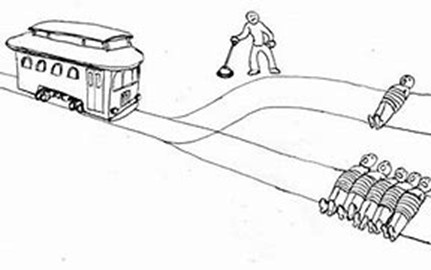By Ira Katz
May 1, 2025
For years one of my conversation pieces while discussing the various life decisions about school, employment, place to live, etc., was to pose "the fundamental philosophical question." What would you do if you won the lottery? That is, if you didn't need money what would you do with your life? How would you spend your time? What was really of value to you? Clearly I am not a professional philosopher. I have never even had a course in philosophy.
Notwithstanding my lack of philosophical bona fides, here I write about a theoretical philosophical dilemma called the Trolley Problem.

From Wikipedia, "The trolley problem is a series of thought experiments in ethics, psychology, and artificial intelligence involving stylized ethical dilemmas of whether to sacrifice one person to save a larger number. The series usually begins with a scenario in which a runaway trolley or train is on course to collide with and kill a number of people (traditionally five) down the track, but a driver or bystander can intervene and divert the vehicle to kill just one person on a different track."
Clearly, the sense of the problem as posed behooves a utilitarian response. More precisely, you are led to make a calculation, one versus five, to determine the greatest good. The equivalent of the trolley problem was posed in the Sanhedrin about 2000 years ago. In the Biblegateway the NIV bible has a section titled: The Plot to Kill Jesus (My emphasis in bold.)
45 Therefore many of the Jews who had come to visit Mary, and had seen what Jesus did, believed in him. 46 But some of them went to the Pharisees and told them what Jesus had done. 47 Then the chief priests and the Pharisees called a meeting of the Sanhedrin.
"What are we accomplishing?" they asked. "Here is this man performing many signs. 48 If we let him go on like this, everyone will believe in him, and then the Romans will come and take away both our temple and our nation."
49 Then one of them, named Caiaphas, who was high priest that year, spoke up, "You know nothing at all! 50 You do not realize that it is better for you that one man die for the people than that the whole nation perish."
51 He did not say this on his own, but as high priest that year he prophesied that Jesus would die for the Jewish nation, 52 and not only for that nation but also for the scattered children of God, to bring them together and make them one. 53 So from that day on they plotted to take his life.
During our own lifetimes we can think of Secretary of State Madeleine Albright as she calculated the death of thousands of Iraqi children as being "worth it."
The point of this philosophical exercise can be considered a variant of the Milgram experiment; that is, to implant the idea in people to take orders to do or accept evil. In modern life this has become commonplace. Be it the response to Covid in dozens of ways, climate change, terror, Russia, China, the list is endless. A utilitarian calculation is presented to give an excuse for doing evil.
Think back to the trolley problem. What if you are being told a lie about the five people on the other track, and in fact, the whole purpose of posing the problem is to convince you to kill the one person who is on the other track? The trolley problem is simply a philosophical trick question.